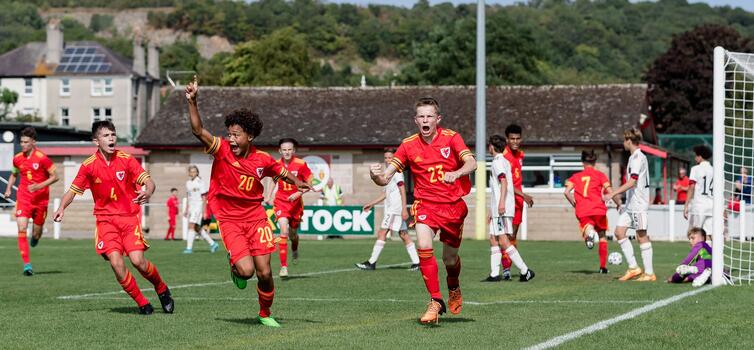Tournament that gives stars of the future a chance to shine

Wales hosted the Futures Tournament
Written by Simon Austin — August 29, 2022
LAST week an important youth tournament took place in North-East Wales, although you probably won’t have heard about it.
The Under-16s Futures Tournament was organised by Uefa and featured Wales, Belgium, Sweden and Denmark. All of the players who featured were selected because they were late developers.
This was a pilot for Uefa, although Belgium have been organising futures matches and tournaments for more than 12 years. In attendance last week was Professor Sean Cumming from Bath University, who is a world leader in growth and maturation in sport.
He told TGG about it but, first of all, explained why it was needed - basically because national youth teams have traditionally been dominated by early maturers.
“I remember going to an U16 tournament at St George's Park (in 2019) that featured England, Norway, France and Brazil," Cumming said. “Brazil, in particular, could have been adults. It's easy to spot the early developers, especially if you’re familiar with growth and maturation - square jaw, facial hair, broad shoulders, high lean mass.
“This wasn't surprising, because players who mature in advance of their peers possess notable advantages in terms of size and athleticism, resulting in an increased likelihood of being selected. However, the pressure to win can encourage early developers to over-rely on their physical attributes at the expense of their technical, tactical and psychological development and late developers are more likely to be overlooked.
"If you ask any Academy Manager in England, they will tell you that the national youth teams are dominated by early developers."
Belgium, who have a much smaller playing pool than either Brazil and England, became aware of this issue many years ago and began to focus on the late developers instead. One of them was Kevin De Bruyne, who has a June birthday, and who lagged behind his peers physically when he was a youngster.
Luckily, the Belgian Football Association were aware of the issue and had started to make sure they were looking after the talented late developers. De Bruyne didn’t make a national team until the U18s but, as they say, the rest is history.
“Belgium have been ahead of the game on growth and maturation,” Cumming said. “They realised that they were selecting early developers who weren’t then progressing and set out to do something about it.
“Typically you might not see a player reach their physical potential until the age of 19 or 20. Belgium held a tournament where they grouped early developers, late developers and those who were on time and got scouts to assess the late developers and look for future potential.
“They then set up a futures programme and put the assistant manager of the U16s in charge of it. This allowed the late developers to stay in the system and they've seen that this is where a lot of the future talent has come from. They've continued to put a heavy emphasis on that futures programme."
Thibaut Courtois and Dries Mehrtens are other example of late developers who have gone on to have stellar careers for Belgium. The futures matches and tournaments give exposure to international football that the late developers would probably have missed out on otherwise.
Cumming said: "One Danish player in particular last week was brilliant. He does usually play for the U16s, but this tournament gave him the opportunity to take on a more prominent leadership role than he usually does."
Although Sweden, Denmark and Belgium were "confident they were fielding early maturers" last week, because of the research and data they have collected about their players, Wales fielded their U15s team.
They don't currently have a futures programme and Cumming says: "They fielded U15s but you could could tell that a lot of them were early developers who were more physically developed."
David Adams - Wales Chief of Football, who also attended the tournament last week - added: “We don’t have the talent depth to field a purely late development squad so selected from our knowledge of the players physically and also socially and psychologically.”
Sweden use the Khamis-Roche method and Denmark and Belgium the maturity offset method to select their late developers. We won't go into any more detail on the pros and cons of each method in this article, but you can read more about them here.
As well as the matches, there were presentations on growth and maturation from representatives of the different countries. These presentations were by: David Penneman, Belgium’s U16s Head Coach; Tommy Lundberg, Lecturer and Researcher at the Karolinska Institute; Rasmus Porse from the Danish FA; and, of course, Cumming himself.
England hasn’t held an international futures tournament yet and Cumming admitted: “There’s a lot of talent we are missing out on in the UK.”
This is partly because of England's large talent pool, which perhaps makes maturation less of a pressing issue than it was in Belgium; and also the fact that Premier League Academies hold the physical data on their players, which they are often wary of releasing.
However, Cumming pointed out that the Premier League Academies are world leaders - not only in football but sport as a whole - when it comes to growth and maturation.
“Screening started in English Academies under (former Premier League Head of Youth) Ged Roddy and (former Head of Elite Performance) James Bunce and there has been a lot of education and also biobanding tournaments," he explained.
“There has been significant investment in this area and the sport science support at the clubs is outstanding. Southampton, Bournemouth, Arsenal and Manchester United are clubs I would pick out as particular leaders. The Premier League Academies are the gold standard, ahead of probably any other sport in the world.”
He hopes that the FA and national teams can now pick up this baton too.







-1.png)





